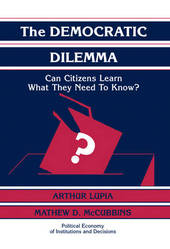
|
The Democratic Dilemma: Can Citizens Learn What They Need to Know?
Hardback
Main Details
| Title |
The Democratic Dilemma: Can Citizens Learn What They Need to Know?
|
| Authors and Contributors |
By (author) Arthur Lupia
|
|
By (author) Mathew D. McCubbins
|
| Series | Political Economy of Institutions and Decisions |
|---|
| Physical Properties |
| Format:Hardback | | Pages:300 | | Dimensions(mm): Height 229,Width 152 |
|
| ISBN/Barcode |
9780521584487
|
| Classifications | Dewey:306.2 |
|---|
| Audience | | Professional & Vocational | |
|---|
| Illustrations |
24 Line drawings, unspecified
|
|
Publishing Details |
| Publisher |
Cambridge University Press
|
| Imprint |
Cambridge University Press
|
| Publication Date |
13 March 1998 |
| Publication Country |
United Kingdom
|
Description
Most citizens seem underinformed about politics. Many experts claim that only well-informed citizens can make good political decisions. Is this claim correct? In The Democratic Dilemma, Professors Lupia and McCubbins combine insights from political science, economics and the cognitive sciences to explain how citizens gather and use information. They show when citizens who lack information can (and cannot) make the same decisions they would have made if better informed. As a result, they clarify the debate about citizen competence.
Reviews"The Democratic Dilemma is an impressive treatment of one of the most important issues in democratic theory: the individual's inability to make fully informed decisions. This book shows that rational ignorance and the continuous pursuit of knowledge, are inseparable concepts, with far-reaching implications for the analysis of politics. It redefines the research agenda in democratic theory and information. This book is a must for all students of political institutions." Pablo T. Spiller, University of California, Berkeley "This book is a must read for anyone interested in the design of democratic institutions." Roberta Romano, Yale Law School "The Democratic Dilemma does for modern democracy what Aristotle's Rhetoric did for ancient Athens...This combination of classic and modern insight results in a powerful and compelling book." Mark Turner, University of Maryland "Drawing on rational choice theory, cognitive science, experimental methods, and just plain old fashioned common sense, they develop a tight and compelling argument about information, persuasion, institutions, and democratic performance." Kenneth A. Shepsle, Harvard University "Lupia and McCubbins have created a powerful, methodoologically sophisticated tool...Graduate collections." Choice
|